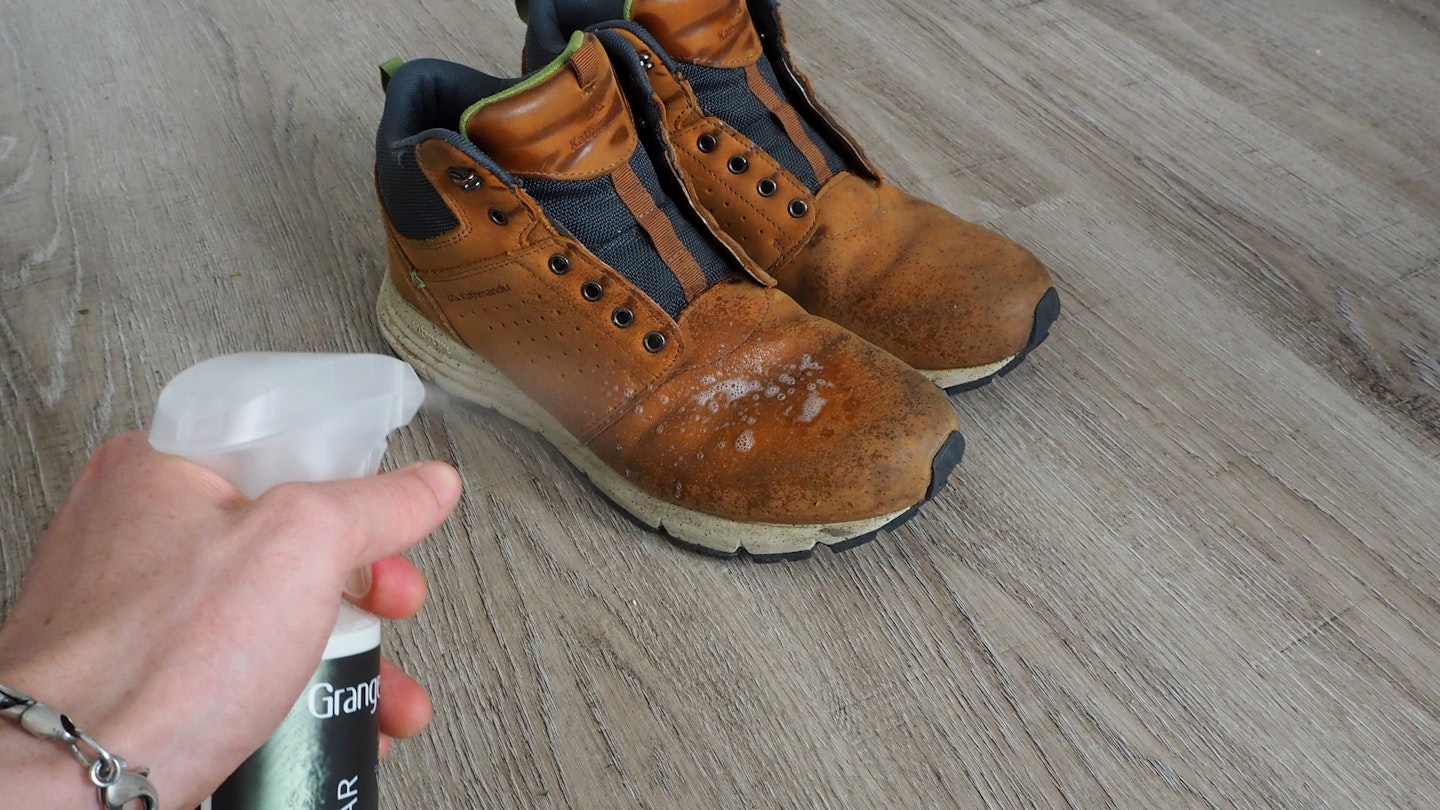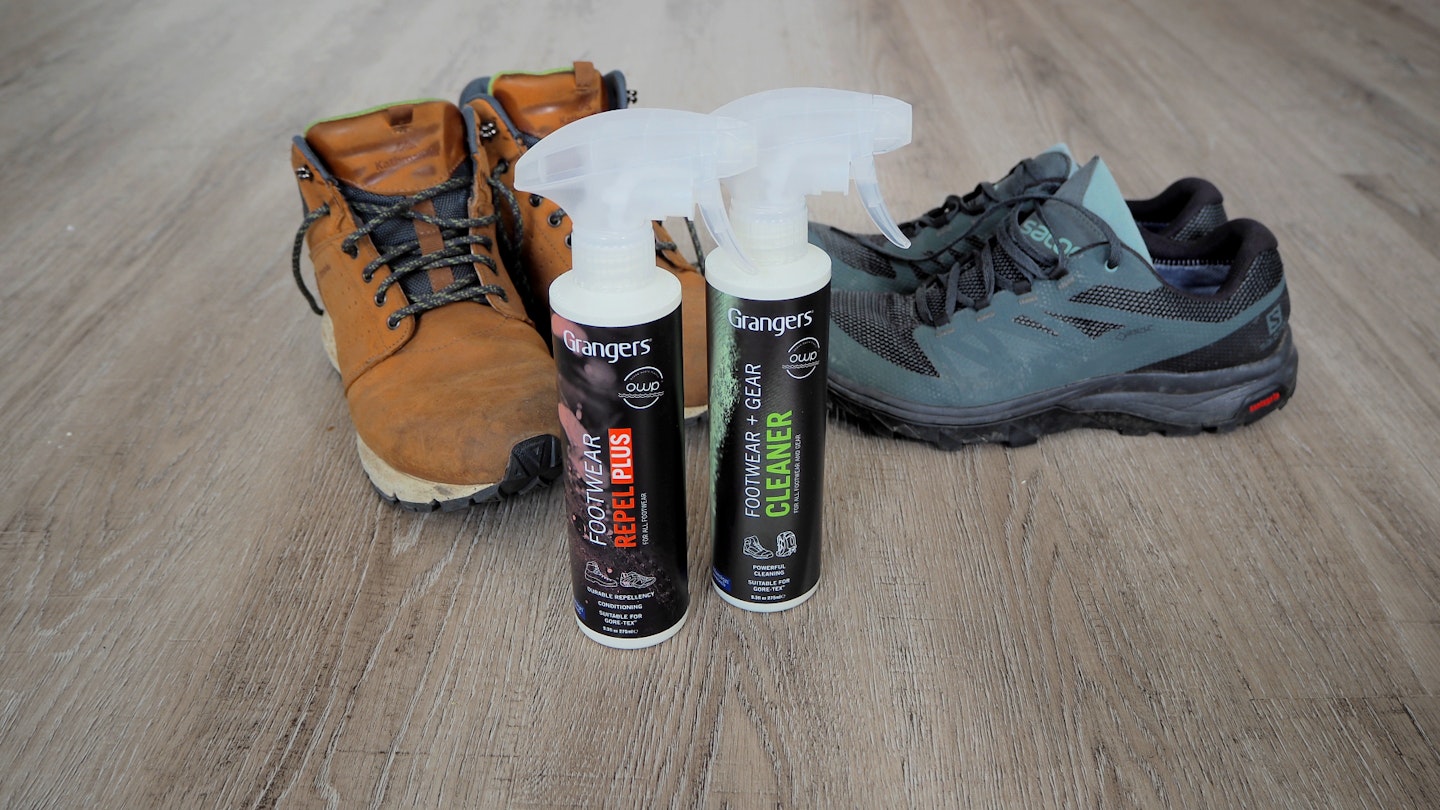In prolonging and maintaining your outdoor gear, cleaning and care is essential. Footwear often goes neglected. They do require more TLC than banging off the dried mud. If you want their breathability and waterproofness to remain, you need to use appropriate products.
Grangers' Footwear + Gear Cleaner and Footwear Repel Plus sprays are just such products. The former claiming to clean and restore the appearance of footwear, while the latter claims to reproof and condition.
We've put them to the test on leather and Gore-Tex to see if they deliver.

www.ellis-brigham.com

www.ellis-brigham.com
About Grangers
Grangers is a British company that has been around since 1937. It's based in Derbyshire and developed the first water-based waterproofing solution ten years later, in 1947.
The brand has stuck with the water-based method, refusing to employ the use of PFC's - fluorocarbons. The debate surrounding public health and PFC's continues, with ever-more studies concluding with results that show PFC's as a negative thing. But Grangers has avoided that issue altogether, sticking with water-based solutions.
Moreover, Grangers' products are bluesign approved, and since 2020 the plastic from which its spray bottles are made is from Ocean Waste Plastic.

The company's eco and sustainability credentials are therefore where we expect all companies to be these days. Unfortunately, that's not the case and therefore Grangers stands out as better than most, even in the outdoor gear industry. But credibility is one thing, product effectiveness is vital too.
The test
There were two pairs of shoes for the Grangers footwear sprays to tackle. One was a pair of Kathmandu boots that are not bona fide hiking boots by any means, but crucially, the leather uppers were in need of a clean. The light-coloured leather presented a substantial challenge to Grangers' cleaner.

The other pair were Salomon Outline GTX hiking/trail shoes. They were about a year old and only lightly dirty but had not yet received any water repellency treatment to maintain the waterproof Gore-Tex liner.
Footwear + Gear Cleaner
Application is very simple: remove the laces and any loose dirt from the shoes; cover the shoes with cleaner and rub gently with a soft brush or cloth, before removing any excess cleaner.

If using in tandem with the Footwear Repel Plus (and you should for waterproof footwear), you can apply it while the shoes are still damp from the cleaner.
The results were mixed. For the Salomons, the Footwear + Gear Cleaner worked very well, removing the dirt and refreshing the fabric. I was optimistic with the leather shoes, perhaps unrealistically hoping for a miracle. The Footwear + Gear Cleaner lifted some of the dirt (evident on the cloth) but not all of it. They looked better, without question and they look considerably better than what the photo below suggests. You'll just have to take my word on that.

Footwear Repel Plus
This was crucial to the Salomon shoes. Application is similar to the cleaner, only you don't work it in with a cloth or brush. Simply spray it on and wipe away any excess and leave them to dry.
The result? Good. Below, you can see water beading on the fabric as it should. The leather shoes are were not waterproof to begin with, and the Footwear Repel Plus is meant to restore water repellency not add it. Therefore, it won't magically make the leather shoes waterproof but I added some anyway because it helps with stain resistance and is a good conditioner for leather, nubuck, and suede.

How much of each product did you use?
For the two shoes, about 15 per cent of the bottle volumes (275ml) was used.
Verdict
The only hiccup we encountered was the partial rather than complete stain-lifting of the light leather shoes by the Footwear + Gear Cleaner. It worked very well on the synthetic material. The Footwear Repel Plus is excellent, doing exactly as it should.
Therefore, restoring footwear appearance was quite good but crucially, restoring functionality was very effective indeed.
There is sustainability to consider too. It's no longer 'nice to have', sustainable manufacturing practices are an essential part of how things need to be made from now on. We've tried ignoring it, and it really hasn't worked.
